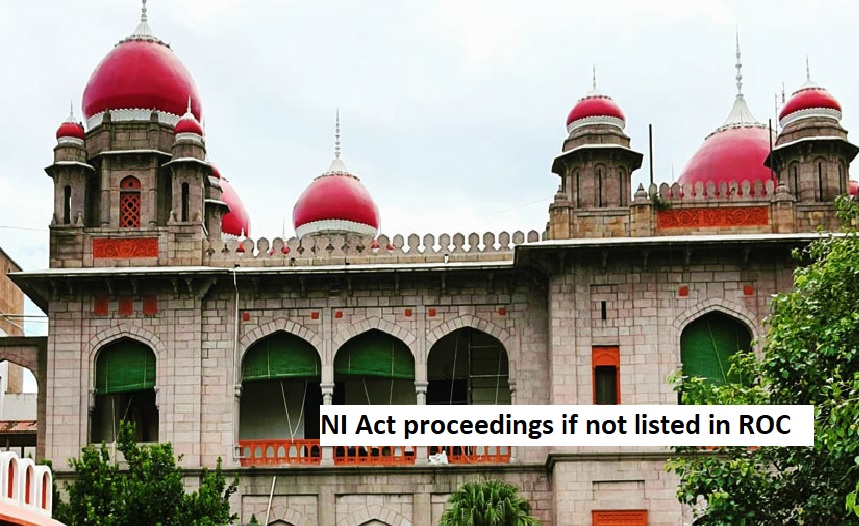


Telangana High Court: Executive Director not exempt from NI Act due to absence in ROC record.
Justice E.V. Venugopal noted that ROC doesn't verify Director roles.
The petitioner's counsel argues that the petitioner is not an authorized signatory for the accused company, based on ROC records. Thus, prosecuting the petitioner would be an abuse of the law. However, this argument lacks merit as the N.I. Act does not provide any protection in this regard, as per this Court's view.
Additionally, it can be deduced that ROC records don't verify Directors' roles, except for authorized signatories designated for Companies Act compliance with ROC, not for business transactions under N.I. Act.
The Bench considered a petition from an accused in a check bounce case, asserting that the NI proceedings against him as the executive director of M/s Bheema Cement Ltd were unjustifiable and should be dismissed.
Proceedings under the NI Act were initiated by M/s. Gangadhar Oil Refinery India Limited (Respondent No. 1) against M/s. Bheema Cements Limited, along with various individuals including its Chairman, Managing Director, Whole-time Director, Director, Executive Director, and authorized signatories. The complaint alleged that all the accused were collectively responsible under sections 138 and 142 of the N.I. Act for issuing dishonored cheques and sought compensation.
The Oil Refinery argued that M/s. Bheema had been buying Indonesian and South African steam coal on credit and had partially paid for it using a letter of credit.
Following the reconciliation of accounts, M/s. Bheema had an outstanding debt of INR 4,08,75,201/- to the respondent No. 1, the oil refinery. Despite multiple payment demands in 2013 and 2014, the cheques issued by M/s. Bheema bounced due to insufficient funds or account blockage.
Feeling wronged, the refinery launched legal action against M/s. Bheema and the other individuals involved. They argued that the Executive Director (the petitioner in this case) was responsible for the company's daily operations and had collaborated with the signatories who issued the bounced cheques.
The petitioner's counsel argued that despite taking on the role of the Executive Director, no ROC records indicated this. Additionally, the petitioner neither signed the cheques nor oversaw the company's daily operations, making it unjust to hold them accountable for the dishonored cheque.
In contrast, the respondent argued that the petitioner had confessed to being the Executive Director of the company in a letter and in another case before the Sessions Court. Furthermore, in the aforementioned case, the petitioner acknowledged that he held the position of Executive Director in 2014 and later became a shareholder before resigning from the role.
Justice Venugopal noted that in a letter from 2005, the accused company had appointed the petitioner as the Executive Director, entrusting him with the management of the company's daily operations, particularly in finance. Therefore, the petitioner couldn't avoid responsibility.
It can be argued that the petitioner, in active collusion with the company's affairs, deliberately and maliciously issued the disputed cheque to the concerned bank. Consequently, the petitioner is also vicariously liable under Section 141 of the N.I. Act as he is accountable to the company for its conduct and business, and is responsible for managing the company's affairs.
The Court emphasized that the Executive Director cannot claim protection from proceedings under the Negotiable Instruments Act, 1881, solely based on the absence of their name in the Registrar of Company Affairs (ROC) records.
The petitioner's counsel argued that the petitioner is not an authorized signatory for the accused company according to Registrar of Company Affairs records, and thus, prosecuting the petitioner would be an abuse of the legal process. However, the court found no merit in this argument, as the N.I. Act does not offer any protection in this regard.
Justice E.V. Venugopal additionally noted that the Registrar of Company Affairs (ROC) does not verify the roles of Directors.
Furthermore, it can be deduced that ROC records do not validate the roles of Directors, except for the designated authorized signatories listed in ROC records, who handle the statutory requirements under the Companies Act with the Registrar of Company Affairs, not the business transactions of the legal entities, especially regarding the Negotiable Instruments Act.
The Court, in dismissing the petition, instructed that if the petitioner wished to establish that he was not an Executive Director, he should present this during t
TAGS: Court dismissal Petitioner's claim Trial direction Executive Director role Lower Court testimony.